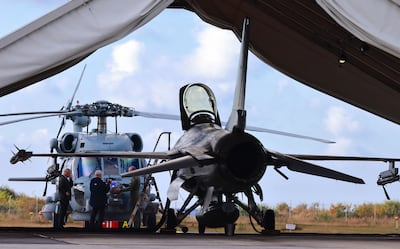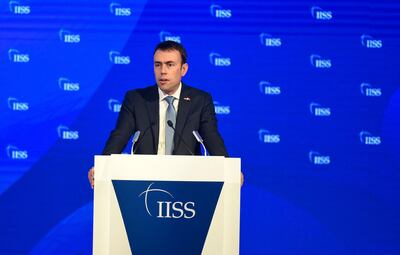Sabotage of the Nord Stream gas pipelines off the coast of Denmark and Sweden has extended the scope of European defence and deterrence challenges, a spokesman for Germany's biggest political party has said.
Nils Schmid, the spokesman for the biggest party in Germany's ruling coalition, the Social Democratic Party (SPD), said the war in Ukraine had not only triggered a €100 billion ($97.87bn) defence spending increase in his country but a whole new set of needs for defending its interests.
A Nato-led defence build up was the pillar but not the only part of that response. "We should not be too [complacent] about the return of Nato and the return of territorial defence because we have to take into account hybrid warfare to a much larger extent than we did in the 1970s or 1980s during the Cold War," Mr Schmid told a security conference at Chatham House on Thursday. "The latest developments surrounding pipeline leakages in the Baltic Sea demonstrate to us that seabed warfare, the threat to communications lines, is now part of the game."
The targeting of remote installations on the seabed represents only one example of hostile activity that defence planners recognise as a pattern. "We’ve seen hybrid warfare coming on for some years now in Europe, with attacks on Bundestag [the German Parliament] premises here in Berlin, hacker attacks and disinformation campaigns," Mr Schmid said.
An expansion of defence and security measures to prevent attacks is in the works, says Angus Lapsley, Nato's assistant secretary general for defence policy and planning. “We have to be able to deal with, as the last 24 hours have shown, events happening around us that Russia may be behind, that are hybrid in nature, are not to do with overt military conflict but are testing the alliance and indeed the European Union in different ways,” he told the Chatham House conference.

Officials in the UK have said the authorities and energy asset operators are already “engaged” in discussions over whether extra security measures are needed at various plants including pipelines, said Offshore Energies UK, Britain’s main lobby group for the oil and gas industry.
Britain’s offshore facilities already have well-tested security arrangements but it is sensible to see if there is “anything else we could and should be doing to be prepared from a physical security perspective”, Mark Wilson, the company's operations director, told a briefing.
The role of Nato in deterrence was defined at its Madrid summit this year as encompassing conventional military dangers, nuclear as well as more insidious encroachment. "There are things happening below the threshold of conflict that we need to see if we can defend and deter against — attacks on infrastructure would be a good example," said Mr Lapsley. "Nuclear weapons remain a critical part of how the alliance maintains deterrence and we are seeing in the events of the last couple of months that that’s not an abstract notion, it's something we need to understand how we do, day in, day out."

Germany's pacifist history stretches back more than seven decades, while only France is a nuclear power in the European Union. Berlin's new procurement programme marks a shift in its stance with an important element of integration with Nato's nuclear deterrence.
"A very special feature of deterrence — nuclear deterrence — is also part of our package in Germany," said Mr Schmid. "So F35 fighter planes will be purchased by our armed forces."

